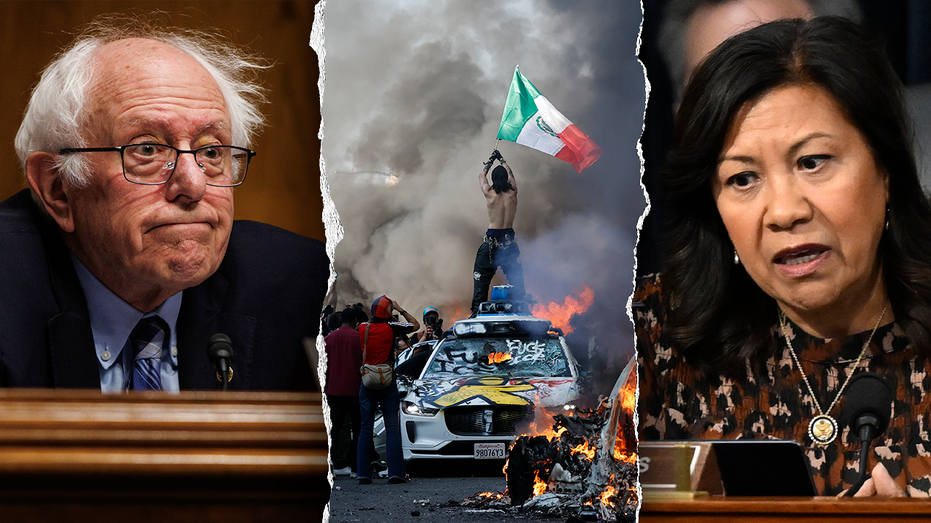Democrats Shift Messaging on Law and Order Amid Rising Immigration Riots After J6 Era
California Democrats criticize Trump’s immigration raids in L.A. while defending law enforcement post-January 6.

Elected Democrats across the nation have come under scrutiny as their approach to law enforcement appears to shift in response to federal immigration raids in Los Angeles. While Democratic leaders sharply condemned the violence at the U.S. Capitol on January 6, 2021, and championed law and order at that time, many have now voiced fierce opposition to federal actions targeting undocumented immigrants in their home cities. The contrast has become especially stark as protests over the raids erupted into violence throughout Los Angeles this past weekend.
Statements from top California officials reflect the intensity of the moment. Governor Gavin Newsom denounced the federal immigration raids and described the deployment of National Guard troops to Los Angeles as a move befitting a “dictator, not a President.” Similarly, Los Angeles Mayor Karen Bass described the city as gripped by fear and called the arrival of federal agents a dangerous escalation, urging protesters to remain peaceful amid mounting tension in immigrant communities. Both Newsom and Bass stressed support for those facing the raids, highlighting the contributions of immigrants to California’s social fabric and vowing to coordinate with local immigrant rights organizations and law enforcement.
Federal authorities converged on the city early Friday, launching immigration enforcement operations as part of President Trump's campaign promise to remove millions of undocumented immigrants who entered during the Biden administration. The swift response from local Democratic officials included outright condemnation of the raids, echoing widespread disapproval among progressive lawmakers nationwide. Within hours, protests in downtown Los Angeles escalated, as demonstrators clashed with federal officers, hurled projectiles, set vehicles ablaze, looted businesses, and temporarily seized control of a stretch of the 101 Freeway.
President Trump responded to the spiraling unrest by activating 2,000 National Guard members for deployment to Southern California—a rare move that bypassed the state governor, who traditionally controls such forces during emergencies. The White House justified the action as essential for restoring law and order, especially after the Los Angeles Police Department deemed the protests unlawful and arrested dozens of violent demonstrators. Administration officials have accused local Democratic leaders of abdicating their responsibilities to protect residents and law enforcement officers.
The deployment ignited a heated debate over states’ rights and federal authority. Democratic officials, including Senator Bernie Sanders and former Vice President Kamala Harris, decried the raids and the arrival of federal troops as authoritarian and provocative, arguing that such measures would only inflame an already volatile situation. They pointed out that neither the governor nor the mayor had requested military support, and suggested the administration was using the crisis to expand executive power at the expense of constitutional norms.
Critics on the right were quick to accuse Democrats of hypocrisy, pointing to their previous calls for law and order in the aftermath of the January 6 attack. On that day, Democrats widely honored law enforcement, condemned “insurrectionist violence,” and urged unity behind legal institutions. This week, however, some Democrats have issued statements supporting protesters and slamming federal agencies like ICE, with some even calling for their removal from Los Angeles. The disparity in tone and rhetoric has led to accusations of double standards and political opportunism from Republican figures and federal officials, who argue that vilifying law enforcement endangers officers and undermines public safety.
Despite their objections to the raids and federal intervention, several Democratic leaders have insisted that violence and property destruction will not be tolerated. Mayor Bass called on the Los Angeles Police Department to restore calm and prosecute offenders, but reiterated her belief that local agencies—not federal authorities—are best equipped to handle civil disturbances. Others, such as Representative Norma Torres, made distinctions between what they described as legitimate law enforcement during the Capitol riot and what they called overreach by immigration authorities in California.
As clashes continued, federal officials maintained that the raids are necessary to enforce immigration laws and protect American citizens. They expressed frustration with what they described as “dangerous rhetoric” from sanctuary city politicians, blaming them for inciting hostility and violence toward federal agents. Meanwhile, National Guard patrols remain active in key areas of Los Angeles, even as protests show no signs of abating and the city grapples with the political and humanitarian fallout.
The events in Los Angeles have reignited a national debate about the limits of protest, the responsibilities of elected officials in times of crisis, and the tension between federal and state authority. With both sides accusing each other of undermining democracy and fostering chaos, the city stands at a crossroads, searching for a path back to stability while the nation watches closely.




